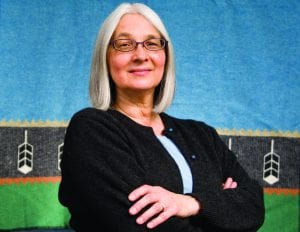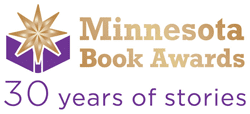Each day leading up to the 30th annual Minnesota Book Awards Ceremony, we’ll be featuring an exclusive interview with one of our 36 finalists. Learn more about these incredible local writers and gear up to see the winners announced live in person April 21.
Interview with Linda LeGarde Grover, author of Oigamiising: Seasons of an Ojibwe Year
Category: Memoir & Creative Nonfiction, sponsored by Faegre Baker Daniels

Because Onigamiising: Seasons of an Ojibwe Year is at heart a love story written to the extended tribal family of Ojibwe ancestors, relatives and descendants of Minnesota, I feel great appreciation that my small part of our big story has received this recognition. When I first learned about Onigamiising being named a finalist, it was on the Star Tribune’s website: I stared at the computer screen, blinked, read it again and then called my husband. Then I began to purely and simply enjoy, as I do to this minute, being in such company as the other Memoir/Creative Nonfiction finalists.
What does writing mean to you?
Writing is fun, it makes me happy to do it, and I have a story to tell. My body of work, which consists of two published books of fiction, a third not yet published, a poetry collection and my collection of short essays Onigamiising: Seasons of an Ojibwe Year, tells that story. The backdrop of Anishinaabe (Ojibwe) history and worldview and impacts of government Indian policy on the world of northeastern Minnesota Anishinaabe life is the story I write to tell, through my perspective as an Ojibwe woman born in the mid-twentieth century who now lives in the twenty-first. Many Anishinaabeg who went before me made this possible: writing is a privilege and an honor.
Why are stories important for our communities?
The stories are everything. We Anishinaabeg of northern Minnesota love a good story and come from a long line of ancestors who shared histories and traditions through storytelling. Much of our oral tradition involves stories that teach what it takes and what it means to be a good Aninishinaabe, that entertain while they instruct, and that recount our past as they prepare us for the future. The lives and stories of our ancestors are filaments of that unbreakable thread of continuity, our lives as individuals each a single bead on that thread. Woven together, the patterns they have formed over time form the beautiful, ever-flowing design that is our story and our existence.
Tell us something people might not know about you.
I have no set writing schedule and seem to do my best writing when the tv is on.
What do you love about libraries?
Libraries are one of the things I love best about this country: anyone can use the library, and it’s free. I remember my mother overseeing me as I practiced printing my name in preparation for going to the library to apply for a card, and I remember that little orange card, made of a heavy paper with a numbered metal plate that was imprinted on the checkout card. How I loved going to the library, where I saw elderly people reading the newspapers, high school kids using the card catalog and studying at the tables, adults browsing in the fiction room looking for something to read. I sensed that we were all part of something bigger than ourselves. Breathing in the scent of books and furniture polish in that old Carnegie library building, I fell in love with the place, especially books and all they held. I still feel that way about libraries.
More about Linda LeGarde Grover:
Linda LeGarde Grover is a member of the Bois Forte Band of Ojibwe and a professor of American Indian Studies at the University of Minnesota Duluth. Her books have received the Flannery O’Connor Award for Short Fiction, the Janet Heidinger Kafka Prize, the Northeaster Minnesota Book Award for Poetry, the Red Mountain Press Editor’s Choice award, and the Wordcraft Circle of Native Writers & Storytellers Fiction Award. She lives in Onigamiising (Duluth) with her husband Tim and near their children and grandchildren. Linda is a a lifelong student of Mino-Bimadiziwin, the Ojibwe living of a good life; she integrates this endeavor into her writings, in the traditional Oibwe style of pedagogy and continuity: she has a story to tell.
See the winners announced live at the 30th annual Minnesota Book Awards Ceremony!



